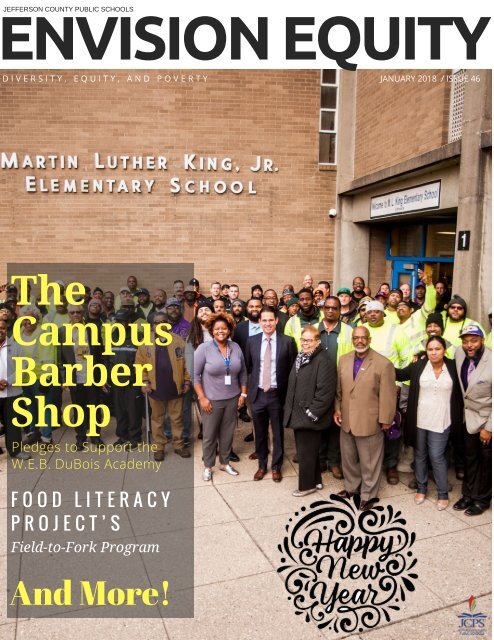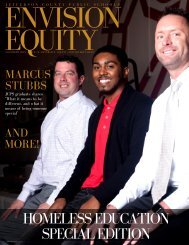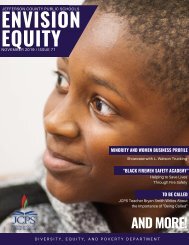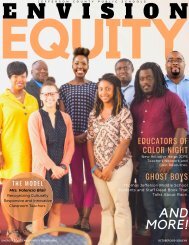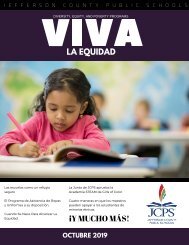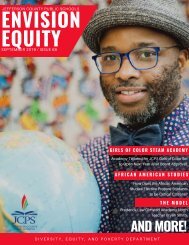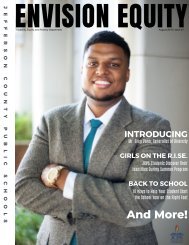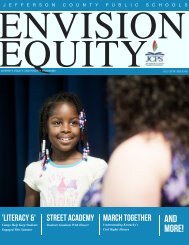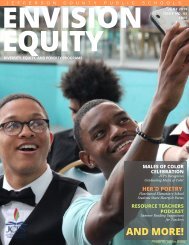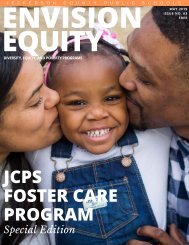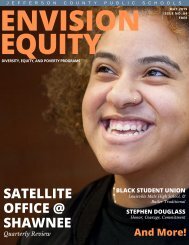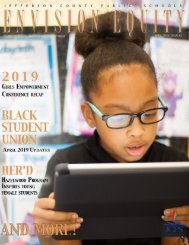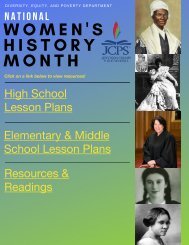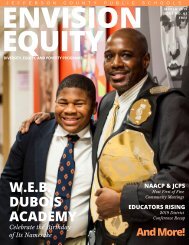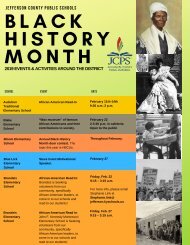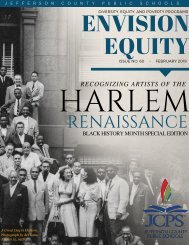January 2018 Envision Equiity
You also want an ePaper? Increase the reach of your titles
YUMPU automatically turns print PDFs into web optimized ePapers that Google loves.
JEFFERSON COUNTY PUBLIC SCHOOLS<br />
NVISION EQUITY<br />
D I V E R S I T Y , E Q U I T Y , A N D P O V E R T Y JANUARY <strong>2018</strong> / ISSUE 46<br />
The<br />
Campus<br />
Barber<br />
Shop<br />
Pledges to Support the<br />
W.E.B. DuBois Academy<br />
F O O D L I T E R A C Y<br />
P R O J E C T ’ S<br />
Field-to-Fork Program<br />
And More!
Above, J. Divine Alexander, Owner/Operator of<br />
The Campus Barber Shop.<br />
The Campus<br />
Barber Shop<br />
Pledges to Support the<br />
W.E.B. DuBois Academy<br />
By J. Divine Alexander— Owner/Operator, The Campus<br />
Barber Shop<br />
Photo, Abdul Sharif<br />
Allow me to introduce myself. My name is<br />
J. Divine Alexander, I am the owner/<br />
operator of The Campus Barber Shop. I<br />
have been a barber shop owner for over 18 years<br />
and I have been a licensed professional barber<br />
for the last 22 years. I am also the founder of a<br />
nonprofit organization called Urban Barbers of<br />
Louisville. The Campus Barber Shop is dedicated<br />
to community outreach. We have collected food<br />
for the homeless at the Lords Kitchen, collected<br />
toys and coats for the Home of the Innocents,<br />
participated in the Books and Barbers program<br />
with Metro United Way, hosted barbershop shop<br />
talks with the University of Louisville and the<br />
Louisville Urban League, and provided haircuts<br />
for the homeless outreach program through a<br />
partnership between Fleur's Dream and the<br />
Urban Barbers of Louisville.<br />
2<br />
Continue on next page
ENVISION EQUITY JANUARY <strong>2018</strong><br />
The Campus Barber Shop greatly appreciates<br />
the W.E.B. DuBois Academy and Jefferson<br />
County Public Schools for allowing The<br />
Campus Barber Shop to serve as mentors<br />
with the Barber Shop leadership<br />
initiative. We at The Campus Barber Shop<br />
pride ourselves on community work outside<br />
of the barbershop. Our Barber Shop slogan is<br />
Above, J. Divine Alexander and W.E.B. DuBois<br />
Academy Principal Robert Gunn.<br />
Community, Grades, and Fades. Our goal as<br />
professional Barbers is to, "alter your outer<br />
appearance to build inner confidence" in<br />
order to impact the lives of our youth and<br />
anyone we come in contact with. We know<br />
we can reach students at an earlier age to<br />
influence and inspire them to become<br />
positive role models and productive citizens<br />
in our communities. In trying to achieve this<br />
initiative, we try to dress professionally to set<br />
a positive example for our younger<br />
customers. This is a reflection of what the<br />
youth should see and want to aspire to be,<br />
whether they become Barbers or not.<br />
Above, barbers Alex Hopkins, J. Divine Alexander, and Tyler Pope-<br />
Hogan of The Campus Barber Shop.<br />
(In 2015 J. Divine Alexander made history not<br />
only for himself, but for the city of Louisville.<br />
He was the first and only barber to compete<br />
and place (2nd) in the Bronner Bros.<br />
international hair show. In 2017, he was<br />
awarded the community-service award as<br />
well as the innovative barber award).<br />
www.thecampusbarbershop.com<br />
3
ENVISION EQUITY JANUARY <strong>2018</strong><br />
Leaning Into Equity<br />
With a Deeper<br />
Learning Shift:<br />
From Power and Control to Empowerment and Values<br />
By Justin Allen—Deeper Learning Resource Teacher<br />
Power and Control<br />
In the Deeper Learning Department, we<br />
are pushing for equitable educational experiences<br />
by supporting teachers in a paradigm shift: from<br />
controlling our classrooms through<br />
power; to empowering, By Darryl<br />
engaging, and Muhammad embracing Ali<br />
our classrooms with values.<br />
There are three main<br />
sources of power that<br />
attempt to control<br />
teaching and learning in<br />
classrooms: The power of<br />
governments to control<br />
what is taught and when it<br />
is taught, the power of<br />
testing corporations to control<br />
how it is taught and how it is<br />
measured, and power of the teachers<br />
to coerce, manipulate, and extrinsically<br />
reward students for compliance and<br />
“achievement”.<br />
When our classrooms are focused on control<br />
through power, there is little space for the<br />
authentic engagement of the students or teachers.<br />
Power and control require compliance. While<br />
students or schools from in-power communities<br />
may be successful at playing this power game,<br />
students and schools in out-of-power<br />
Young—<br />
communities<br />
Center<br />
live it differently… the<br />
choice students are forced to<br />
perceive is: submit to the<br />
control or fight against it. Go<br />
through the motions, rebel, or<br />
drop out.<br />
As equity-minded teachers,<br />
we know that putting kids in<br />
this position is unethical. It<br />
amounts to educational<br />
malpractice.<br />
Deeper learning teachers bring a<br />
combination of old and new method in a<br />
truer pedagogical paradigm to the students, one<br />
that resists the marginalization of students<br />
already in the margins of social, economic, and<br />
4<br />
Continue on next page
ENVISION EQUITY JANUARY <strong>2018</strong><br />
political power. We bring something as deep, real, and authentic as the kids are because they don’t<br />
have the patience for the false and fake.<br />
We bring ourselves in a way that moves kids, speaks to them, and shows them how to speak to and for<br />
themselves. We meet and embrace them where they are. We flip the power-game script, because kids<br />
smell fake better than we do, and they thirst for the real and the true.<br />
So when we flip the power-game upside down, what do we find? Everyone from Ralph Ellison to Alphie<br />
Kohn has been telling us for years, and when we listen, we move beneath the surface of power-based<br />
control into the values that lead to learner empowerment.<br />
Empowerment and Values<br />
Deeper learning teachers engage and empower our classrooms by:<br />
Valuing student strengths; relationships, culture, communities.<br />
Valuing student inquiry; curiosity, initiative, passion, and instinct.<br />
Valuing students as producers of purposeful work, and not just consumers of learning.<br />
Valuing student voice by including students as equal contributors in the conversations and the coconstructions<br />
of these values.<br />
When we engage our classrooms through values, students value themselves and each other.<br />
Classrooms are less dependent on power or control to force their choices. They rely on the values they<br />
have established together, developing their own agency and self-control.<br />
This equips students to create themselves into people who work for more equitable outcomes, in two<br />
ways. First, by developing their capacities for critical thinking and compassionate communication, thus<br />
equipping them to be citizens who see and speak to systemic and institutional racism; who speak truth<br />
to power.<br />
Secondly, a values-based approach awakens students to their own agency and empowerment,<br />
equipping them to shun victimization. They can then make the personal choices that create the lives<br />
they imagine for themselves; the lives that we know they are capable of achieving.<br />
This is not always a straightforward task. It’s as complex as real life. But we are teachers! We are<br />
creative, we have the communication skills to relate and to be relatable, and we have the caring to see<br />
this through. The work of the Deeper Learning Department is about this shift to valuing the<br />
development of people: teachers, students, and the relationships between them; through the equitable<br />
growth of all their many capacities.<br />
The Project<br />
Continue on next page
ENVISION EQUITY JANUARY <strong>2018</strong><br />
Deeper learning is broad term for a variety of pedagogical attitudes focused on valuing and developing<br />
all learners, students and teachers, towards...<br />
Strengths-based approaches; recognizing as assets the relationships, culture,<br />
communities, the people that our students bring to the classroom.<br />
Learner-centered, learner-driven experiences; leveraging intrinsic curiosity, initiative,<br />
instinct, to motivate and drive inquiry, passion, and the making sense and meaning of<br />
the world.<br />
Authentic products for real audiences, because when students are producers of purposeful<br />
work and not just consumers, there is a reason behind what we do.<br />
Valuing student voice by including students in the co-constructions, the choices, and the<br />
creation of their classrooms…<br />
There are many methods and approaches for creating values-oriented classrooms: Cross-Cultural<br />
Competence, Project-Based Learning, Social-Emotional Learning, Passion Projects, CARE for Kids,<br />
Different Ways of Knowing, Inquiry-Based instruction, and the newest iteration of these values,<br />
Professor Marcus Haynes and Dr. Chris Emdin’s concept Ratchedemics.<br />
They are all deep, and they are all real. They are all about valuing all students’ strengths, voices, and<br />
cultures. At its heart, deeper learning is about doing school with kids, and not to kids. It’s about<br />
flipping the script from power and control to empowerment by values.<br />
Only then will the next generation of our people be the citizens who can continue the great democratic<br />
tradition of speaking truth to power. Only then will the people be able to recreate for all of us the large,<br />
complex institutions that, as Dr. Robin DiAngelo truly observes, “that whites built and dominate...<br />
often at the expense of and on the uncompensated labor of other groups.”<br />
It is about us, teachers and students, developing each other’s capacity to make, and remake, these<br />
social, economic, and political institutions. It is the ultimate cooperative group work. The world is The<br />
Project. The Deeper Learning Department is about valuing and developing our people for this work,<br />
because it’s our world that we make.
ENVISION EQUITY JANUARY <strong>2018</strong><br />
Fostering a Supportive School<br />
Environment for Students in<br />
Foster Care<br />
By Lindsay Bale—JCPS Foster Care Liason<br />
S<br />
tudents in foster care have unique challenges they bring to school with them as a result of abuse,<br />
neglect, and/or dependency. These challenges can include not knowing where they will be living<br />
from week to week, difficulty building relationships and trusting others, not having a “typical” family,<br />
learning problems, difficulty sleeping due to nightmares, acting out behaviors, and more. There are over<br />
800 children in foster care who attend JCPS schools. As educators, we can create school cultures that<br />
help students in foster care overcome these challenges, and help them feel supported and safe.<br />
One important thing school personnel can do to help students in foster care is to maintain confidentiality.<br />
It is important that the student is not publicly labeled as a foster child, and only those who need to know<br />
are made aware of the student’s foster care status. Ensure that you do not discuss the student’s private<br />
matters in public places, such as a breakroom, restroom, etc. Also, notify students of school visitors<br />
related to their foster care status in a private manner.<br />
If a student in foster care is frequently absent, the absences could be related to their foster care status.<br />
For example, they may have parent visits, sibling visits, therapy appointments, court dates, etc. Ensure<br />
that these absences are excused and work with students to make up any work missed due to these<br />
absences.<br />
Educators should be aware of the challenges faced by students in foster care when they are given an<br />
assignment or activity that is related to family. Assuming that students live with their birth families, or<br />
know their family history (i.e. family trees, making Mother’s Day or Father’s Day cards) can present<br />
challenges for students in foster care. Help students by providing alternative activities for all students,<br />
which will avoid calling attention to the students in foster care.<br />
Another way for school personnel to build a safe and supportive environment for students in foster care is<br />
to invest in building a trusting relationship. This will take time, as students in foster care can have a<br />
difficult time trusting adults, but your investment will be worth it. Go out of your way to engage students<br />
who may be suffering in silence. Celebrate accomplishments and successes, recognize birthdays,<br />
encourage students to build on their strengths, and spotlight their positive attributes to students and<br />
7<br />
Continue on next page
ENVISION EQUITY JANUARY <strong>2018</strong><br />
their caregivers. Positive, caring adult relationships are instrumental to the<br />
success of children in foster care.<br />
Students in foster care often feel out of control due to the circumstances in<br />
which they were placed in foster care without a choice in the matter. It is<br />
imperative that students in foster care are given the opportunity to express<br />
their opinions and have a voice in the decisions made about their<br />
education. Students in foster care experience high rates of school mobility.<br />
Lindsay Bale<br />
With the passage of ESSA which was authorized in December 2015, students<br />
are now able to stay in their school of origin when it is in their best interest. When best interest<br />
determinations are made regarding a student’s school placement, a student’s opinion on whether they<br />
want to stay in their school should be taken into consideration. This is one example of a time when<br />
students can be given a voice. Educators should also advocate for the best interest of the child to remain<br />
in the school of origin when possible. Educators can do this by participating in the best interest<br />
determination meeting, and by contacting the Foster Care Coordinator to request transportation for a<br />
child in foster care to remain in their school of origin.<br />
Another way to create a supportive environment is by assuring that students in foster care know what<br />
supports are available to them at school. Identify a trusted adult in the building that the student can<br />
speak to when he/she is having a rough day, having worries about parents or siblings, having difficulties<br />
in the foster home, etc. Be certain that students know about counseling services, FRYSC services, CAP<br />
closet, or other supports available to them. Students may need basic supplies, such as uniforms, back<br />
packs, clothing, hygiene supplies, etc., especially when they first enter foster care. When possible, help<br />
students access these things.<br />
Implementing trauma-informed practices in the classroom is imperative to the success of students on<br />
foster care. It is important for school personnel to understand the impact that trauma can have on<br />
students; especially related to learning, behaviors, cognitive development, responses to adults, and<br />
interaction with peers. Students who have been exposed to trauma are often misdiagnosed, which can<br />
lead to students not receiving appropriate educational services. By completing a comprehensive<br />
evaluation, educators can rule out that a student’s difficulties are a trauma response as opposed to<br />
another disability. Being informed about trauma informed practices will help educators and those<br />
working with children who have been traumatized to respond to children in a way that is sensitive to<br />
their unique needs. For a free copy of the Trauma Toolkit for Educators produced by the National Child<br />
Traumatic Stress Network, follow this link: https://rems.ed.gov/docs/<br />
NCTSN_ChildTraumaToolkitForEducators.pdf.<br />
At times, school is the most stable and consistent part of the life of a foster child. Following these<br />
suggestions can help students in foster care feel safe and supported in the school environment, thereby<br />
increasing academic success. Do these little things every day to make a big difference!<br />
For questions, support, or assistance contact JCPS Foster Care Coordinator Lindsay Bale at 485-6358 or<br />
Lindsay.bale@jefferson.kyschools.us.
ENVISION EQUITY JANUARY <strong>2018</strong><br />
The Power<br />
of a Mentor<br />
Josh Parker<br />
By Josh Parker— 2017 Lowell Milken Center Fellow - 2012 Maryland Teacher of the Year.<br />
"Show me a successful individual and I'll show you someone who had real positive influences in his<br />
or her life. I don't care what you do for a living - if you do it well I'm sure there was someone<br />
cheering you on or showing the way. A mentor." -- Denzel Washington<br />
O<br />
scar-winning actor Denzel Washington entitled his first book, 'A Hand to Guide Me,' dedicating it to<br />
the mentors that helped shape his life. If he had not met the mentors who were willing to sponsor<br />
his dream, we may have never experienced the gift of a brilliant acting career. When we consider<br />
equity, this idea of sponsorship should play prominently in how we approach the work. There may not be<br />
another Denzel Washington, but what we need are more students who have mentors that help them<br />
believe the best about themselves. The equity move for the next couple of weeks (or longer) is to be a<br />
sponsor to a student (or educator) of color.<br />
"A mentor is someone who allows you to see the hope inside yourself." -- Oprah Winfrey<br />
Oprah had Ms. Duncan (her 4th grade teacher), Quincy Jones had Ray Charles and Luke Skywalker had<br />
Obi-Wan Kenobi. Even Rudolph, the Red Nosed Reindeer had a sponsor - Santa! (Think about it). My first<br />
sponsor was a principal named Tom Shouldice.<br />
***<br />
On a hot Saturday in August of 2005, Mr. Shouldice interviewed me for an English Language Arts position<br />
at Dundalk Middle school. As we toured the facility, he inquired about my interest and experience. I had<br />
more of the former and none of the latter, but I had passion. He saw this passion and offered me the<br />
position; he saw my inexperience and paired me with a mentor - Mrs. Eleanora C. Hall. Six years later, he<br />
saw a nervous Black male educator whom he hired win the top award in the state.<br />
This moment could not have happened without him. Because of him, I have been able to sponsor many<br />
teachers and students in the years since that August day, helping students and teachers reach their best<br />
selves through effective instruction and coaching. If equity is about fit for all and access to the<br />
underserved; then those who profess to be equity warriors must be in the business of sponsoring or<br />
9<br />
Continue on next page
ENVISION EQUITY JANUARY <strong>2018</strong><br />
Pictured above: Mrs. Trivas (my former assistant principal), Mrs. Shanks (my former<br />
English/Language Arts department chair), Mrs. Potter (former Mathematics<br />
department chair) and Mr. Shoudice on the night I won the MD Teacher of the<br />
Year award.<br />
mentoring students and teachers.<br />
We must use the connections that<br />
we have to prepare and then place<br />
students in rooms that may seem to<br />
big for them now; but rooms that<br />
they may be standing in front of in<br />
time to come.<br />
Two weeks ago, I received a<br />
message from another informal<br />
mentor in my prior district:<br />
"Afternoon - it is with great sadness<br />
that I inform you that Tom Shouldice<br />
passed away."<br />
In a heartbeat, my August<br />
conversation with him ran through my mind. I mentally sped through many of our interactions in the<br />
three years I was under his leadership to the visits I made to his office when I left the classroom and then<br />
to the last time I saw him alive - at his retirement dinner. I had few words then and the ones I have left<br />
comprise the body of this blog. Just then - another image came to my mind that took on a different<br />
meaning. The time he sat me in his office and put me on a Teacher Assistance Plan during my second<br />
year of teaching.<br />
I remember sitting across him in a comfortable chair. My heart flashed and I looked at him with<br />
confusion in my eyes. "I thought I was a good teacher," I said, while the Assistant Principal was entering<br />
into the room. I was beside myself.<br />
"You have the potential to be, but this process will ensure that it happens," he said. He did not appear<br />
moved by my confusion, but rather resolute in putting me through a process that could have broken me<br />
or made me. In the months that followed, I found my voice. The process made me better.<br />
Mr. Shouldice was and always will be my first assistance plan. My first sponsor. I can only honor him by<br />
paying his gesture forward.<br />
***<br />
If you are reading this article and have experienced any modicum of success, you had a sponsor. A<br />
mentor. I wonder how many of our underserved students who may eventually drop out or live lives<br />
controlled by other people can say the same. We can be a student's assistance plan if we set our minds<br />
to not only give them access to rigorous coursework and instruction, but to the tools and processes that<br />
cultivate the character necessary to succeed in challenging and rewarding spaces. It is on us to put them<br />
in positions to win. Let's get to work.
Classroom Instruction Principle<br />
Provide access to and preparation for challenging content and enrichment experiences<br />
Three Actions/Strategies to Implement Today<br />
1. Use your agency and privilege to put students in powerful places. What are some connections<br />
that you have as a teacher that can allow students to be 'at the table' or 'in the room' where<br />
decisions are made? What can you do to help them see the real-life application of the content they<br />
are studying? On an even more basic level, how can you help them to become co-creators of their<br />
daily classroom and schoolhouse experience?<br />
2. Proclaim the 'what's next' for your students and challenge them to get there. When you see<br />
promise in a student; stoke that fire with articles, information, scholarships or experiences that can<br />
help them deepen that knowledge. If a student is a fan of writing fiction, sponsor him/her to enroll<br />
in a community college course, massively open online course (mooc) such as this one or just offer<br />
to have this student attend a book signing of a famous fictional author. When the author is talking,<br />
whisper in your student's ear - "I can see you doing this."<br />
3. Showcase your colleagues (and students) via your own platforms. Since being named<br />
Maryland Teacher of the Year in 2012, I have had the honor of being able to use my platform to<br />
promote the profession as well as urgency of equity. Recently, I had the privilege of using this<br />
platform to highlight a young teacher (and his amazing students) who I am coaching. It is a joy to<br />
be able to use what you have been blessed with to sponsor the next generation of teacher leaders.<br />
How are you using your platform to catapult others into positions of influence and learning?<br />
Two Resources for Further Study<br />
• Selecting Complex Texts (blog) - by @EducationNomad (Sierah Tyson) - https://<br />
blog.unbounded.org/selecting-complex-text-pt-1/<br />
• Teaching with Challenging Texts: Prior Knowledge (video) by Dr. Tim Shanahan - https://<br />
www.youtube.com/watch?v=YVmuG5I0cx4<br />
• One Inspirational Quote/Video<br />
• Linda Cliatt-Wayman - How to Fix a Broken School? Lead Fearlessly and Love Hard - https://<br />
www.ted.com/talks/<br />
linda_cliatt_wayman_how_to_fix_a_broken_school_lead_fearlessly_love_hard<br />
"For they are all our children; we will either profit by or pay for what they become." -James Baldwin<br />
Josh Parker, an award-winning educator and instructional coach, uses his experiences in urban schools—and as a black<br />
male teacher—to share practices that help teachers and school leaders better serve their students of color.
ENVISION EQUITY JANUARY <strong>2018</strong><br />
Food Literacy Project’s Field-to-<br />
Fork Program<br />
By Laura Krauser, Program Associate, Food Literacy<br />
You may be familiar with the Food<br />
Literacy Project: established in their<br />
current home at Oxmoor Farm and<br />
offering education and<br />
transformative experiences for<br />
young people on a working<br />
vegetable farm in the Hikes Point<br />
area. In the past several years,<br />
they have worked to expand their<br />
efforts through an urban farm<br />
initiative, developing an outdoor<br />
classroom and replicating their<br />
successful discovery-based Fieldto-Fork<br />
Program model in south<br />
Louisville at Iroquois Farm. A few<br />
miles past Churchill Downs in the<br />
Hazelwood neighborhood, a<br />
nearly nine-acre plot of land<br />
exhibits the power of community,<br />
sustainable agriculture, and<br />
innovation. Formerly host to Iroquois Homes<br />
public housing complex, demolished in 2008,<br />
the ground beneath Iroquois Farm is<br />
historically lush with neighborhood interaction.<br />
The Food Literacy Project aims to build on<br />
neighborhood assets, address challenges, and<br />
invite youth to drive change in their<br />
community. Without traveling too far, south<br />
Louisville residents of all ages will be able to<br />
nourish their community through hands-on<br />
field-to-fork experiences – touching, smelling,<br />
cooking, and tasting fresh fruits and vegetables<br />
-- while cultivating a love for healthful foods<br />
and the earth.<br />
With a mission to transform youth and their<br />
communities through food, farming, and the<br />
land, the Food Literacy Project’s Field-to-Fork<br />
Photos, Laura Krauser<br />
Program unleashes the joy of real food, as<br />
youth and families cultivate the knowledge,<br />
skills, and access needed for a lifetime of<br />
healthy eating through direct experience<br />
planting, harvesting, and cooking with farmfresh<br />
vegetables. Working with schools and<br />
community-based organizations, the Food<br />
Literacy Project envisions a just and<br />
sustainable food system that cultivates healthy<br />
people and places by engaging youth and<br />
families from urban neighborhoods that face<br />
limited access to fresh vegetables and<br />
significant health disparities. Hazelwood<br />
Elementary, which is adjacent to Iroquois Farm<br />
and partners closely with the Food Literacy<br />
Project, reflects many of the neighborhood’s<br />
challenges, with 96% of the student population<br />
participating in the free/reduced lunch<br />
program. It is a diverse school community<br />
reflecting the great ethnic and racial diversity of<br />
Continue on next page
ENVISION EQUITY JANUARY <strong>2018</strong><br />
the neighborhood, which is a primary resettlement area for immigrants and refugees in a historically<br />
white, working class community.<br />
Iroquois Farm is an exciting expansion of The Food Literacy Project’s 11-year history of rich community<br />
partnerships in south Louisville. They helped establish a now thriving garden at Americana Community<br />
Center in 2006. In 2009, they launched their yearlong farm-based education program with Hazelwood<br />
Elementary. In 2012, they partnered with KentuckyOne Health and Sts. Mary and Elizabeth Hospital to<br />
bring afterschool programs and family engagement opportunities to<br />
local schools. The Food Literacy Project launched a Youth<br />
Community Agriculture Program (YCAP) at Iroquois High School last<br />
year and have been engaging teens from the neighborhood with<br />
their summer YCAP job opportunities since 2012. These relationships<br />
have laid the groundwork for the success of the Food Literacy<br />
Project’s new outdoor classroom and Field-to-Fork Program at<br />
Iroquois Farm.<br />
Farm-based education programs kicked off at Iroquois Farm this<br />
past fall. Students from adjacent Hazelwood Elementary (who can<br />
literally see the farm from their classroom windows) walked over for<br />
a field study. Portland Elementary students also enjoyed the field-tofork<br />
experience at our new urban farm<br />
Students in the academic-year Youth Community Agriculture<br />
Program (YCAP) at Iroquois High School also built a relationship with Iroquois Farm and helped bring the<br />
vision for a new outdoor classroom to fruition. Students met weekly to explore food and farming issues,<br />
cook healthy recipes, and engage with their local food system. In October, students harvested sweet<br />
potatoes planted by the summer YCAP crew and constructed a wood-fired cob oven at Iroquois Farm with<br />
earthen materials. Through this program, 25 young people from 12 different countries offered unique<br />
knowledge and excitement around planting, harvesting, and building at Iroquois Farm. One student<br />
recalled his background growing food in the Congo remembering, “We grew potatoes just like this on our<br />
farm!” The hard work and passion of both summer and academic-year YCAP participants have created<br />
new resources at Iroquois Farm, enriching the opportunity for other young people to discover the power<br />
of growing, cooking, and eating wholesome foods.<br />
The Food Literacy Project will continue to support and expand access to food production and food<br />
education with a farm that feeds community members and invites them to discover how food grows. They<br />
will support a culture of wellness and engage children and families in planting, harvesting, and<br />
developing recipes with the vegetables they help grow right in their own community. The future is bright<br />
for Iroquois Farm and its neighbors, as the Food Literacy Project is helping youth and families develop the<br />
knowledge, skills and access needed to thrive and drive community change. Their Iroquois Farm project<br />
will promote health equity and a renewed sense of place and neighborhood pride.<br />
Follow the Food Literacy Project’s growth at Iroquois Farm via social media: Facebook, Instagram, and Twitter.
ENVISION EQUITY JANUARY <strong>2018</strong><br />
COLLEGE<br />
Is In My Near Future!<br />
By Le’Artis W. Allen— Alpha Phi Alpha Fraternity, Inc.<br />
As the men of Alpha Phi Alpha Fraternity, Inc. Alpha<br />
Lambda chapter close out the remainder of their fall<br />
educational programming, the theme of October’s<br />
session caught the eyes of many students and gave<br />
them hope for a brighter future, Careers in Technology.<br />
The men took their youth academy on a college tour to<br />
Ivy Tech the middle of October where the students were<br />
exposed to practical knowledge in the fields of science,<br />
math, and technology. Ivy Tech offers hands-on<br />
experience with some of the state’s most advanced<br />
technologies and training facilities, plus the<br />
convenience of more than 1,000 online classes, and the<br />
attention that comes with a small average class size of 22.<br />
Photo, Le’Artis W. Allen<br />
Youth were amazed at what a two-year college degree could afford them after high school. “Our students<br />
were impressed and eager to tour the campus, especially when they learned the starting hourly wages<br />
that could be earned just from receiving an associate degree,” said Director of Education, Alpha Academy,<br />
Bro. Mark Rorer. A week after the college tour students were able to put what they learned to good use<br />
from watching and participating in an electric safety demonstration through Louisville Gas and Electric’s<br />
Mini City demonstration. This tabletop display of a virtual city went over the importance of electric safety<br />
and why not to touch a down power line. Last month’s theme was vital to growth and development of<br />
today’s youth. It is important that we continue to expose youth to opportunities that may look foreign to<br />
them, because as the old sayings relays, “A mind is terrible thing to waste.” (Author, Unknown)
ENVISION EQUITY JANUARY <strong>2018</strong><br />
Seeking eight to twelve rising leaders from YOUR Louisville-area high school!<br />
Louisville Engaging<br />
Nonviolence Symposium:<br />
Empowered Young Leaders<br />
Free Opportunity for High School Students<br />
Thursday, <strong>January</strong> 18, <strong>2018</strong>, 8:30am 2pm<br />
Held in Saints Hall of<br />
<br />
330 N. Hubbards Lane, Louisville, 40207<br />
Morning Session<br />
Empowered Young Leaders<br />
What do peace, violence, and nonviolence really mean in our present world and how do they<br />
play a role in our lives? Empowered young leaders will join peers from across the city to<br />
consider these questions through activities and discussions. They will learn about ordinary<br />
people and sometimes extraordinary movements that have used or are using nonviolence<br />
creatively and effectively to work for a more peaceful and just world.<br />
Afternoon Session<br />
A Dialogue for the Heart<br />
What is nonviolence in action? How does it connect with growing compassion? After lunch<br />
students will engage with a panel presentation featuring local civic leaders.<br />
Lunch is provided!<br />
Register with Anne Walter at DrepungGomangCompassion@gmail.com or 502-614-5616.<br />
The process employed in the Louisville Engaging Nonviolence Symposium<br />
rests on the principal that non-harm is an essential foundation to building compassion.<br />
Based on universal human values, the symposium is not religious in nature nor is it partisan.<br />
This FREE symposium was developed by the Compassion Education Center of Drepung<br />
Gomang Center for Engaging Compassion, and is made possible for high school students<br />
through a generous grant from Snowy Owl Foundation.
ENVISION EQUITY JANUARY <strong>2018</strong><br />
Uncover the<br />
Roots<br />
of Health and Equity<br />
By T. Benicio Gonzales— MSW, PMP, Center for Health Equity, Louisville Metro<br />
Department of Public Health and Wellness<br />
T. Benicio Gonzoles<br />
T<br />
he Center for Health Equity at the Louisville<br />
Metro Department of Public Health & Wellness<br />
has released a new report—2017 Health Equity<br />
Report: Uncovering the Root Causes of Health. The<br />
report, designed as a tool for policy makers and<br />
residents to better understand how they can create<br />
more equitable policies and practices, examines the<br />
history of Louisville and how our past has influenced<br />
our present.<br />
The top three causes of death in Louisville for the<br />
past five years are cancer, heart disease, and chronic<br />
obstructive pulmonary disease (COPD). Although<br />
cancer is the number one cause of death across<br />
Louisville, the report shows there are differences in<br />
cancer death rates based on where you live, your<br />
gender, and your race. However, because cancer is<br />
not the leading cause of death in the United States,<br />
there are positive changes that can be made to<br />
benefit all Louisville residents by intervening in the<br />
root causes of cancer, such as food systems and<br />
environmental quality.<br />
“Health equity is everybody’s work. We want policy<br />
makers, businesses leaders, government officials,<br />
physicians, schools, civic and nonprofit organizations<br />
and residents to use the report to create equitable<br />
policies and practices so that everyone can thrive for<br />
16<br />
Continue on next page
ENVISION EQUITY JANUARY <strong>2018</strong><br />
our entire city can become healthier,” said Brandy N. Kelly Pryor, PhD., director of the Louisville Metro<br />
Center for Health Equity.<br />
The report shows the demographics and diversity of the city’s residents, noting, for example that<br />
Louisville’s population is growing and becoming more diverse. It reviews 21 health outcomes such as<br />
infant mortality, asthma and teenage pregnancy and examines 11 root causes for those outcomes,<br />
ranging from food systems to neighborhood development. These health outcomes are arranged in the<br />
order of the life course, from infancy through seniors, to demonstrate how root causes have different<br />
impacts at every life stage and can have cumulative effects over time.<br />
Education and early childhood development are two of the root causes of health explored in the report<br />
and demonstrates connections to many of our community’s health outcomes. Early childhood<br />
development and its relationship to health encompass factors such as a child’s social environment,<br />
kindergarten readiness, and opportunities for learning. The educational resources and opportunities<br />
available to each person across the span of their life have an impact on an individual’s employment<br />
and income, which are other root causes of health.<br />
In addition to exploring health outcomes and root causes, the report lists evidence-based best<br />
practices to improve health that are already under way in Louisville, as well as recommendations<br />
proven to have a positive impact in other communities. Examples of best practices include expanding<br />
access to early childhood home-visiting and developmental screening programs like Healthy Start,<br />
enforcing comprehensive smoke-free policies to reduce second-hand smoke exposure, and instituting<br />
policies that help families build wealth, like childcare subsidies and earned-income tax credits.<br />
A few of the findings in Louisville Metro Health Equity Report 2017 include:<br />
• We can improve quality of life and reduce deaths from the leading causes, such as cancer,<br />
heart disease, and Chronic Obstructive Pulmonary Disease (COPD), if we focus on root<br />
causes of health.<br />
• Different groups are affected by different health outcomes. For example, young girls of<br />
color, especially those who are not Hispanic or Black (this includes AAPI, Native<br />
Americans, etc.), are 3.75 times more likely than White girls to have a child between the<br />
ages of 15-19. Additionally, there are significant gender and age disparities—85.2% of<br />
sexual assault survivors were female with a median age of 18 years.<br />
• Louisville’s population is growing and becoming more diverse. The Hispanic/Latino<br />
population has tripled since 2000, and the Asian population has more than doubled.<br />
To view Louisville Metro Health Equity Report 2017, request a presentation or data requests, go to<br />
www.HealthEquityReport.com.
ENVISION EQUITY JANUARY <strong>2018</strong><br />
Youth Chess Secures<br />
College Scholarship and<br />
Gains Job Internships<br />
By Le’Artis W. Allen— Alpha Phi Alpha Fraternity, Inc.<br />
Photo, Le’Artis W. Allen<br />
W<br />
ith 2017 rounding to a close, this year’s<br />
events have been nothing short of<br />
impactful. The men of Alpha Phi Alpha Fraternity,<br />
Inc. are on the move once again with a positive<br />
defense! The first Louisville Scholastic Chess<br />
Open was held this fall on Saturday, October 7 at<br />
the University of Louisville (UofL). Local and<br />
regional chapters of the fraternity teamed up to<br />
offer a different type of competition that was sure<br />
to meet the eye of many, competitive chess.<br />
The event, hosted by the Cleveland and Louisville<br />
chapters of Alpha Phi Alpha Fraternity and<br />
sponsored by JCPS, welcomed dozens of kids to<br />
UofL for a day-long chess tournament.<br />
“With so many other things students could have<br />
been doing on Saturday morning, it was<br />
remarkable to see the overwhelming turnout of<br />
participants,” said Bro. Cecil Brookins, President,<br />
Alpha Lambda Chapter of Alpha Phi Alpha<br />
Fraternity, Inc. “We have a lot of partners in the<br />
community, as well as our other fraternity<br />
chapters to thank for making this event a<br />
success.”<br />
College scholarships and job internships were on<br />
the line for the top competitors, as well as door<br />
prizes, electronic devices and gift cards for others<br />
competing. As many could see this was an<br />
impactful event surely to stimulate the mind in<br />
more ways than none. Its civic involvement and<br />
exposure to such a mind moving activity as chess<br />
that can change the lives of youth. The local men<br />
of Alpha Phi Alpha Fraternity, Inc. hope is to<br />
continue to offer many programs that target<br />
youth and life skills that will expose, nurture<br />
change, and help youth make good decisions.
ENVISION EQUITY JANUARY <strong>2018</strong><br />
Central<br />
High School<br />
Awarded at Kentucky Youth Assembly<br />
By Samuel Olayemi— Central High School Student (Class of <strong>2018</strong>),<br />
Wedekind Fellow, American Civil Liberties Union of Kentucky<br />
Photo provided by Samuel Olayemi<br />
T<br />
he ACLU of Kentucky was proud to sponsor a<br />
team of eight students from the Central High<br />
School Law Magnet at the annual Kentucky<br />
Youth Assembly (KYA). KYA, sponsored by the<br />
Kentucky YMCA, is a program where students from<br />
across the state hold a mock General Assembly.<br />
The Central team passed the “unDACAmented<br />
education” bill. Written by Grace Reyna, Jocy<br />
Portales, Kendall Vance, and Avani Ray, this bill was<br />
an act to expand eligibility, specifically for<br />
undocumented students, for the access to and use<br />
of KEES (Kentucky Educational Excellence<br />
Scholarship) money for educational benefit. Grace<br />
shared the group’s vision. “We aspire to expand<br />
eligibility for KEES money to undocumented<br />
students because education should have no<br />
borders. Every student has the ability to measure<br />
their own level of difficulty in the journey of<br />
education but education should be an equal<br />
opportunity to obtain as a privilege,” she stated.<br />
From their efforts on the bill, they were all awarded<br />
with the Top Ranked Bluegrass Bill award, an<br />
award given to the top bill in the Bluegrass section<br />
of the capitol during the convention. Moreover, for<br />
her extraordinary efforts on the delegation of the<br />
bill, Grace Reyna received the Outstanding<br />
Delegate award. Congratulations to the 2017<br />
Central High School Delegation for such a<br />
successful year!<br />
19
ENVISION EQUITY JANUARY <strong>2018</strong><br />
Fraternity Deems<br />
Lock-In a Success!<br />
By Le’Artis W. Allen— Alpha Phi Alpha Fraternity, Inc.<br />
School administration<br />
at Kammerer Middle<br />
School, along with<br />
members of Alpha Phi Alpha<br />
Fraternity, Inc. – Alpha<br />
Lambda chapter are calling<br />
last Friday night’s Alpha<br />
Academy lock-in a success.<br />
The men of the Alpha<br />
Lambda chapter of Alpha Phi<br />
Alpha Fraternity, Inc. hosted<br />
its second lock-in with their<br />
academy program. More<br />
than 40 students were in attendance, ranging<br />
from grade levels 6 th through 8 th . The lock-in was<br />
from 2 p.m. – 9 p.m. to help keep youth males<br />
out of trouble and teach messages on higher<br />
education, health and hygiene, and life skills – in<br />
addition to one of the fraternity’s national<br />
programs, Project Alpha, which is designed to<br />
help young males make better and more<br />
informed choices about responsible behavior<br />
and relationships.<br />
With so much going on in today’s society, it is<br />
important that youth males have an outlet and a<br />
positive path set before them. “We want to<br />
empower and encourage our youth men in the<br />
academy,” said Mark Rorer, Director of<br />
Educational Programming, Alpha Lambda<br />
chapter. “These are some very talented,<br />
intelligent, articulate young men. Our goal is to<br />
give them an opportunity for them to express<br />
themselves in a safe environment.”<br />
Photo, Le’Artis W. Allen<br />
Throughout the evening students were put in<br />
groups and rotated to various sessions with<br />
instructors who gave presentations on current<br />
events. In the middle of the agenda the men of<br />
the Alpha Lambda chapter decided to add a<br />
little bit of friendly fitness challenges to keep the<br />
young men engaged. There were also awards<br />
and prizes offered to the youth for their<br />
participation.<br />
W.E.B. DuBois said it best, “Education must not<br />
simply teach work – it must teach Life.” Through<br />
this lock-in youth males were able to learn,<br />
grow, and expand their horizons with the<br />
understanding that opportunities for greater are<br />
endless.
ENVISION EQUITY JANUARY <strong>2018</strong><br />
Books for Young Readers<br />
What Color Is My World?: The Lost History of African-<br />
American Inventors<br />
By Kareem Abdul-Jabbar and Raymond Obstfeld<br />
Candlewick, 2013<br />
For ages 8-12<br />
Amelia to Zora: Twenty-Six<br />
Women Who Changed the World<br />
By Cynthia Chin-Lee and Megan Halsey<br />
Charlesbridge, 2008<br />
For ages 8-12<br />
This book features illustrated profiles of African American<br />
inventors whose ingenuity helped to create a safer and better<br />
world.<br />
This book profiles twenty-six amazing women and their stories.<br />
It features women who have changed the world through<br />
literature, science, sports, politics, and the arts. Each story is<br />
beautifully illustrated.<br />
Heart and Soul: The Story of America and African Americans<br />
By Kadir Nelson<br />
Jump at the Sun, 2008<br />
For Ages 8 and up<br />
Told through the point of view of an African-American<br />
female narrator, this book tells the story of African<br />
American history - from struggles to triumphs, and the<br />
determination for liberty and justice.<br />
Images obtained from Google Images.<br />
Books provided by Heather Lee, Louisville Free Public Library
ENVISION EQUITY JANUARY <strong>2018</strong><br />
Professional Development<br />
Title Session Code Date & Time Location Contact<br />
Culture, Attitude, Students, 17-1888092 <strong>January</strong> 18, February 15,<br />
and Equity (C.A.S.E.)<br />
March 15, and April 19<br />
4:30 to 7:30 p.m.<br />
Aligning Critical Hip Hop 17-1887300 <strong>January</strong> 19<br />
School Counseling with<br />
4 to 6 p.m.<br />
Counseling Standards (For<br />
school counselors only)<br />
Marion C. Moore School<br />
VanHoose Education<br />
Center, first-floor<br />
conference room<br />
Toetta Taul<br />
(502) 485-8304<br />
Vanessa Posey<br />
(502) 485-3631<br />
Speaker Series: Teacher<br />
Practice and Pedagogy<br />
17-1887590 <strong>January</strong> 23<br />
4 to 6 p.m.<br />
Seneca High School<br />
Telva Hogan<br />
(502) 485-3655<br />
Love 2 Liberation: Other<br />
People’s Children Book<br />
Study<br />
17-1887069 <strong>January</strong> 24 and 31, and<br />
February 7<br />
4 to 5 p.m.<br />
Online<br />
Marcia Carmichael,<br />
Larhondolyn Mathies, and<br />
Erica Young<br />
Refugees of Shangri-La 17-1885504 <strong>January</strong> 24<br />
4 to 6:30 p.m.<br />
Muhammad Ali Center<br />
Dr. Monica Lakhwani<br />
(502) 485-7269<br />
Culturally Responsive<br />
Reading<br />
17-1885306 <strong>January</strong> 25<br />
4:30 to 6:30 p.m.<br />
Engelhard Elementary<br />
Dr. Monica Lakhwani<br />
(502) 485-7269<br />
Culturally Responsive<br />
Pedagogy<br />
17-1885301 February 5<br />
4:30 to 6 p.m.<br />
Fern Creek High<br />
Dr. Monica Lakhwani<br />
(502) 485-7269<br />
Book Study: Our Kids, The 17-1884840 February 8, 15, and 22<br />
American Dream in Crisis<br />
3:30 to 4:30 p.m.<br />
VanHoose Education<br />
Center<br />
Dr. Monica Lakhwani<br />
(502) 485-7269<br />
Speaker Series: Building<br />
Cultural Awareness With<br />
Students<br />
17-1890980 February 12<br />
1 to 4 p.m.<br />
Gheens Academy<br />
Telva Hogan<br />
(502) 485-3655<br />
Poverty and the Brain 17-1885052 February 19<br />
4 to 5:30 p.m.<br />
Seneca High<br />
Dr. Monica Lakhwani<br />
(502) 485-7269<br />
Students With Disabilities<br />
and Bullying<br />
17-18852567 February 21<br />
4 to 5:30 p.m.<br />
Brandeis Elementary<br />
Dr. Monica Lakhwani<br />
(502) 485-7269
ENVISION EQUITY JANUARY <strong>2018</strong><br />
Learn More to Earn More<br />
Did you know someone with a high school or GED®<br />
credential earns nearly $10,000 more each year than a<br />
drop out? How could you use those extra dollars? FREE<br />
classes to help you brush up your skills for the GED<br />
Test® will be held at Louisville Central Community<br />
Centers (LCCC), Inc., 1300 W Muhammad Ali Blvd.,<br />
beginning <strong>January</strong> 8th. Classes meet Monday - Thursday<br />
from 10:00 a.m. to 1:00 p.m. Call 485-3400 to register or<br />
join us for an information session on Monday <strong>January</strong><br />
4th between 10:00 a.m. and 1:00 p.m.<br />
English for Spanish Speakers<br />
Thursday, <strong>January</strong> 4, 6:00 p.m.<br />
Fairdale Library, 10620 W. Manslick Road<br />
The English for Spanish speakers program allows nonnative<br />
speakers to practice English in a relaxed, informal<br />
setting with Yolin, our English-Spanish bilingual<br />
instructor. If you are learning the English language, or<br />
would like to practice conversing in English, come join<br />
us at Fairdale.<br />
Citizenship Class<br />
Thursdays, <strong>January</strong> 4 -25, 11:00 a.m.<br />
Iroquois Library, 601 W. Woodlawn Ave.<br />
Bring your Green Card and state ID to enroll. Students<br />
should have at least a basic level of English<br />
comprehension and conversation, as classes are taught in<br />
English. Instruction is provided by Kentucky Refugee<br />
Ministries. Please contact Rachel Droste<br />
(rdroste@kyrm.org) for more information.<br />
Gentle Yoga<br />
Wednesdays, <strong>January</strong> 3-31, 6:00 p.m.<br />
Middletown Library, 200 North Juneau Drive<br />
Stretch the body, relax the mind. Gentle yoga classes, all<br />
levels, beginners welcome. Bring your own mat or beach<br />
towel and wear comfortable clothing to move and stretch.<br />
This class is for adults and young adults only; no children<br />
please. Space is limited; call 245-7332 to register.<br />
First Time Home Buyers Class<br />
Tuesday, <strong>January</strong> 23, 2:30 p.m.<br />
St. Matthews Library, 3940 Grandview Avenue<br />
Benjamin Weatherholt of Keller WIlliams Realty will<br />
present on how to invest in yourself and your future<br />
through owning your own home.<br />
Internet Basics<br />
Wednesday, <strong>January</strong> 24, 9:00 a.m.<br />
South Central Library, 7300 Jefferson Boulevard<br />
Learn how to use a browser to access the Internet, and<br />
use Google to find information on the Internet. Please<br />
call 964-3515 to register. Ages 14+<br />
<br />
<br />
Continue on next page
ENVISION EQUITY JANUARY <strong>2018</strong><br />
Editor—Catherine Collesano<br />
Editor, Photo Contributor—Abdul Sharif<br />
Credits<br />
<strong>Envision</strong> Equity is a publication of the JCPS Department of Diversity, Equity, and Poverty Programs. All<br />
submissions should be sent to Catherine Collesano at catherine.collesano@jefferson.kyschools.us or Abdul<br />
Sharif at abdul.sharif2@jefferson.kyschools.us. If you are interested in becoming a subscriber or a<br />
contributor to <strong>Envision</strong> Equity, please contact one of the editors at the above email address.<br />
www.jefferson.kyschools.us<br />
Equal Opportunity/Affirmative Action Employer Offering Equal Educational Opportunities


